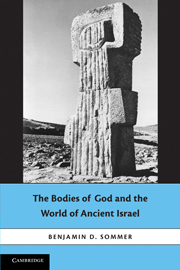Book contents
- Frontmatter
- Contents
- Preface
- Acknowledgments
- Introduction: God's Body and the Bible's Interpreters
- 1 Fluidity of Divine Embodiment and Selfhood: Mesopotamia and Canaan
- 2 The Fluidity Model in Ancient Israel
- 3 The Rejection of the Fluidity Model in Ancient Israel
- 4 God's Bodies and Sacred Space (1): Tent, Ark, and Temple
- 5 God's Bodies and Sacred Space (2): Difficult Beginnings
- 6 The Perception of Divinity in Biblical Tradition: Implications and Afterlife
- Appendix: Monotheism and Polytheism in Ancient Israel
- Notes
- List of Abbreviations
- Bibliography
- Scriptural Index
- Index of Rabbinic Citations
- Subject Index
Appendix: Monotheism and Polytheism in Ancient Israel
Published online by Cambridge University Press: 15 September 2009
- Frontmatter
- Contents
- Preface
- Acknowledgments
- Introduction: God's Body and the Bible's Interpreters
- 1 Fluidity of Divine Embodiment and Selfhood: Mesopotamia and Canaan
- 2 The Fluidity Model in Ancient Israel
- 3 The Rejection of the Fluidity Model in Ancient Israel
- 4 God's Bodies and Sacred Space (1): Tent, Ark, and Temple
- 5 God's Bodies and Sacred Space (2): Difficult Beginnings
- 6 The Perception of Divinity in Biblical Tradition: Implications and Afterlife
- Appendix: Monotheism and Polytheism in Ancient Israel
- Notes
- List of Abbreviations
- Bibliography
- Scriptural Index
- Index of Rabbinic Citations
- Subject Index
Summary
It is a commonplace of modern biblical scholarship that Israelite religion prior to the Babylonian exile was basically polytheistic. Many scholars argue that ancient Israelites worshipped a plethora of gods and goddesses, including Yhwh as well as Baal, El (if or when he was differentiated from Yhwh), Ashtoret, and perhaps Asherah. Preexilic texts from the Hebrew Bible, according to these scholars, are not genuinely monotheistic; the first monotheistic text in the Hebrew Bible is the block of material beginning in Isaiah 40, which was composed during the Babylonian exile. Some scholars recognize the existence of a small minority of monotheists or protomonotheists late in the preexilic period, but stress that the vast majority of ancient Israelites were polytheists before the exile. Another group of scholars, however, argue that the exclusive worship of Yhwh as the only true deity was widespread in ancient Israel well before the exile, perhaps even well before the rise of the monarchy.
In what follows, I hope to accomplish two tasks. I intend to show that the Hebrew Bible is rightly regarded as a monotheistic work and that its monotheism was not unusual for Israelite religion in the preexilic era. At the same time, I hope to explore the limitations of the term “monotheism” in light of the discussion in the body of this book and the review of the literature I carry out in this appendix. The polarity “monotheism-polytheism” has some explanatory value, because it helps us notice something we might otherwise have missed.
- Type
- Chapter
- Information
- The Bodies of God and the World of Ancient Israel , pp. 145 - 174Publisher: Cambridge University PressPrint publication year: 2009
- 2
- Cited by



